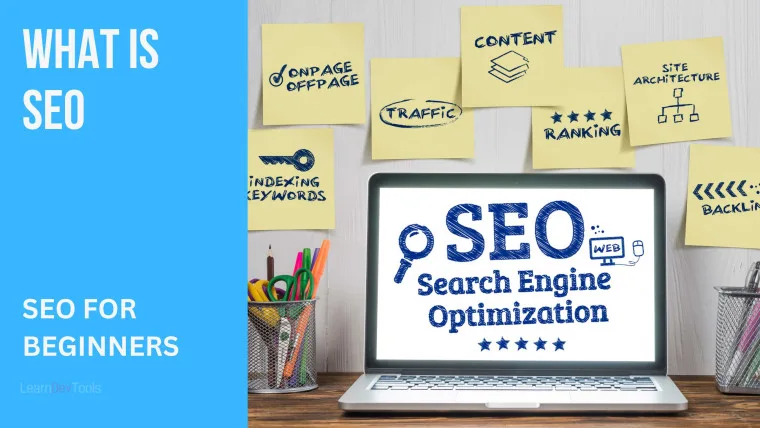SEO content writing, often known as SEO writing, is a deliberate method for generating content to increase its search engine ranking. Every piece of SEO-optimized content must contain the appropriate keywords and consider user needs. We’ll go over some crucial terms for SEO content, as well as methods for making your material more search engine friendly. But before let have a quick overview of what SEO and Content Writing are while keeping in mind the formular SEO + Content Writing = SEO Content Writing
What is SEO?

SEO is an abbreviation for search engine optimization, which is the technique of enhancing both the quantity and quality of organic website traffic through Google and other search engines.Several elements are involved in the process . For example, if your website is mobile-friendly, how quickly it loads, whether your contact information and data are consistent across the internet, and so on.
However, the most well-known and important one is keywords. Why?
Because that is what your target audience types into Google and how they will (or will not) find you.
Some appropriate keywords for my website are ‘medusa tutorial,’ and ‘what is CSS,’ because my primary website pages have been optimized for those!
Want more? Checkout our article on SEO for Beginners
What is Content Writing?

Photo by Kenny Eliason on Unsplash
Content writing is an audience-focused marketing technique that has transformed the business sector by replacing the old corporate, blowing your own trumpet mentality with a ‘let’s create excellent content for our dream consumers’ approach.
Yes, it involves words, but content writing differs from copywriting in that the latter’s goal is to create sales, whereas content writing is about attracting, maintaining, and creating trust with your target audience.
Sure, this will eventually lead to increased sales (duh! ), but the content isn’t usually constructed around the call-to-action to buy.
In truth, content creation mostly consists of informative blog entries on important industry-related themes that your target audience is interested in.
If you offer JavaScript Courses for Beginners, for example, your content writing plan on your company blog may contain posts on “how to start learning Javascript,” “Data structure in JavaScript,” and “Why Should you Learn JavaScript.”
Want to learn more about content writing, Checkout this full guide to Content Writing
What is SEO Content Writing?

Photo by Myriam Jessier on Unsplash
SEO + Content Writing = SEO Content Writing
SEO content writing is a marketing approach that employs keyword research to generate informative blog entries in order to attract and maintain a company’s target audience.
SEO content writing, like the definition of content writing, is about attracting your ideal customers to your website through these informative articles, converting them into a loyal audience, and, eventually, generating more sales.
However, like with SEO copywriting, there is a major emphasis on keywords.
In fact, in order for your articles to be found by your target audience, each blog post must target a separate long-tail keyword (three words or more).
Technically, the terms ‘content writing’ and ‘SEO content writing’ should be interchangeable because you can’t construct an effective content marketing strategy without considering SEO and keywords.
Why is SEO Content Writing Beneficial Today?
Because content is so precious, it’s critical to write high-quality, optimized articles and blog entries. This is where SEO content writing comes into play. Your firm/website may prosper and become an industry authority with the aid of findable content that is interesting and convincing. Hence these are som reasons why this buzz word is important:
SEO Content Writing Improves Ranking
Search engines (such as Google) deliver blog articles, landing pages, and websites to users who seek them. But how do people find your content when they search for a topic related to your business? This is where SEO comes into play to help your content marketing strategy succeed.
It helps you Create a Strong Relationship with Users
By producing relevant, informative, and amusing material, you may quickly create goodwill with potential clients. A well-written SEO content may strike a reader more deeply than paid ads or paid social media postings, and this goodwill can lead to customer conversions.
It Increase Brand Awareness
As your traffic grows and your brand authority grows, there will be more opportunities for new audiences to find you. Content marketing is one of the most powerful and cost-effective methods of reaching out to new audiences, raising brand awareness, and generating new leads.
When you write informative content that is optimized for relevant search terms, you enhance the chances that Google will show your site to new audiences that are interested in what you have to say and offer. Writing high-quality website content also raises the possibility that other industry specialists will link to it.
SEO Content Writing is Less Expense
You must pay for each advertisement click. The cost per click (or impression) on a paid ad varies, but the expense of Facebook or Google ads can quickly add up. With SEO, you make an initial commitment by engaging a writer to create content. Once the article or blog post is published, every organic search click it receives is free; if the content ranks on the first page of Google search results, it can become a consistent source of traffic to your website, eventually allowing you to gain your initial investment.
SEO Helps You Generate New Leads
Anyone who employs a content writing company does so because content creates leads and drives traffic. Businesses are constantly looking for new sources of leads in order to earn income.
SEO content writing is the most effective approach to ensure that customers searching for your products or services find your website and decide to do business with you. This is why you should target keywords relating to your industry.
SEO content authoring focuses on capturing the reader’s interest while also persuading them along the buyer’s journey. Use links, CTAs, and mobile-friendly share buttons to urge readers to act on what they’ve learned. Of course, you don’t constantly want to be advertising to them (most of your content should be informative), but you may sneak some clever marketing efforts into each and every blog article.
SEO Content Writing is for Life
While many pieces of content are time-sensitive, many others will remain important for years to come. This is known as “evergreen content,” and it can continue to drive traffic for years after it was published, depending on the relevance and quality of the post.
Another significant advantage of SEO content writing is that it is intended to produce long-lasting articles and blog entries. And if you notice a drop in traffic, you can easily raise it again by posting that still-relevant content on social media or linking to it from one of your more recent articles.
Learning how to write this type of SEO content will ensure that the time and effort you put into an article is not wasted. Content should be able to last, as any wise business would wish.
SEO Content Writing Build Your Brand Authority
The potential to develop brand authority is one of the many SEO content authoring benefits. Have you ever puzzled why some seemingly insignificant websites are frequently recognized by industry experts and big news publications? The solution is straightforward: the website owner established a reputation as an industry expert through authoritative content.
Authoritative content is that which informs and assists readers in understanding something. You are providing essential knowledge to someone who requires it, establishing your company as an authority on the issue.
This is an effective technique to demonstrate your industry knowledge. Creating blog posts that directly answer client questions might help you establish yourself as a reliable source of information. Any firm that provides knowledge or useful counsel to their consumers can do this.
SEO Writing will Boost Your Traffic
Simply put, all of your search engine optimization activities are aimed at one goal: increasing traffic. When consumers search for keywords relating to your sector, you want to be the one who responds. You want your website to come up as a good choice, especially when they are looking for a product or service.
Remember this formula Unique amazing content + Good On page SEO = SEO Content Writing
Some Key terms you should Know Before Getting started with SEO Content Writing
- Long-Tail Keyword: A series of keywords or phrases, typically 3-6 words long. Long-tail terms are more particular and are searched for less frequently than broad, generic terms. Consider the terms “Learn JavaScript” and “Simple tips to Learn JavaScript today.”
- Meta-Description: A brief overview of a webpage that displays in SERPs (about 160 characters) and can attract searchers to click on a result. To put it simply, it’s the description of your page
- SERP: SERP stands for Search Engine Result Page. In other words, the Google page comprises all of the results that visitors can click on after conducting a search.
- Anchor Text: The hyperlinked words or phrases that guide traffic to other web pages.
- Title tag: The title of a webpage that appears in Google search results and on browser tabs.
- Search queries: Words entered into search engines by users.
- Search volume: The number of times a term is searched for in a given month.
- Organic traffic: The number of users who found your site using a search engine on their own initiative, rather than through sponsored advertisements or other sites.
- Conversion rate: The percentage of visitors who complete the targeted action (a click, a purchase, etc.) divided by the total number of visitors to that page.
- Click-through rate: The percentage of clicks on a SERP result in relation to the number of times the searcher saw that search result.
- Organic keyword difficulty: On a scale of 1 to 100, this statistic indicates how simple or difficult it will be to rank for a certain keyword in organic search.
- Pageviews: The number of times a page has been seen.
- Pageviews per Session: The number of pages read by each user in a single session before leaving the site.
- Page and Domain Authority: On a scale of 1-100, this score indicates how “authoritative” a page or site is.
- Ranking factors: The general factors that search engine algorithms take into account when determining which pages should rank higher than others.
- Structured data (schema): The format of SEO elements such as metadata, keywords, and HTML on the page. Structured data makes it easier for search engines to crawl and index content.
- Backlink: A link that leads to another page of another website or a web resource. Open Link Profiler is a good tool to check your website’s backlinks
How to Get Started with SEO Content Writing
Some Best practices for SEO Content Writing to guarantee a successful SEO Content Writing Strategy
1. Create a List of Topic ideas
SEO content writing starts at the moment you think of a topic or idea to blog about. So it’s important to pick the right topic for the right audience. These are three methods I usually use
Use Questions and answers tools to find what your target audience are searching for online. You can use tools like Answer The Public, Quora and Reddit for that.

Use Google Search. Yes! Notice sometime when you start typing a word in the search fields you will get some suggestions from the engine. These suggestions are generally frequently search terms You can play around to match with your own intent

WikiPedia table of content can equally provide you with idea for your blog. For example if you want to write a blog about the important of open source software, then head to the open source page of WikiPedia and checkout the table of content area, you will find many ideas

2. Transform Your topic into Keywords
The most significant aspect of the SEO writing process is keyword research. Indeed, the proper keyword might make the difference between thousands of monthly views… and a piece of content that no one reads. Fortunately, there are a number of free SEO tools available to help you locate popular keywords.
The tools functions in the same way. You just need to provide a topic idea for example “opensource software”
Infinite Suggest

Keyword Planner

UberSuggest

As you can see some of these tools will show you the exact search volume, and keyword difficulties
Another way to find ideas will be to exam your competitors’s website or a specific post. For that I generally use Google Planner and SEORACH
Check out this example with Google keyword planner

This will show you the keywords that occurs mostly on the page

Another tools I recently started using is kparser. Like others, it generate a list oterms based on the input term
3. Your Content should Match Search intent
Your article should provide consistent information.
For example, I intended to rank for the keyword “full stack development” recently.
And before I even started writing my outline, I checked the SERPs for that keyword.

From the first page result, people want to know more about what is full stack development so I rather write a complete roadmap of full stack development
4. Create Useful Comprehensive Content
Long-form content scores highest in Google, according to some industry research that examined 1 million search results.
That doesn’t imply you have to stuff your content with filler. However, it does imply that you must produce complete content. In other words, content on a single page that covers your topic.
For example, I recently optimized an article about Open source and Free software. The article mostly talk about the main differences between the two terms. After a period of time I was among the first result page

5. Use Keywords in your Content
Including keywords in your article is an important aspect of SEO content production.
The question is, how frequently should keywords be used in SEO content?
There is no such thing as a perfect keyword density percentage. In truth, Google has stated unequivocally that they do not care about keyword density.
(So if you engage a content writer that offers to generate material “with optimized keyword density”, run the other way).
The position of your keyword, in my opinion, is more significant than how many times you utilize it.
I usually use it in:
- My URL
- Title Tag
- Blog Title
- The first 100 words in my page
- Headings(H2,H3) and
- In the content(avoid stuffing)

Your keyword does not have to appear in the first paragraph to be effective. You’re good to go as long as you employ your goal keyword in the first 100-150 words.
Since I use WordPress, the title of my blog post is automatically wrapped in an H1 tag.
The only other thing to remember about H1 tags is that you should only utilize ONE per page. H1 tags are similar to tiny title tags. If you employ more than one on a page, search engines may become confused.
However, in order for your content to be completely SEO optimized, you must also ensure that it is click-optimized.
6. Use Powerful Words in your Title
Organic click-through-rate is a Google ranking indication, according to a Moz case study published on the Moz site.
And, based on my personal research and experience, a greater CTR usually results in higher rankings.
So, in addition to including your keyword in the title tag, you need to optimize it for CTR.
You can accomplish this by including a specified number in your title. for example:
7 Easy Tips and Tricks to Master JavaScript
10 Reason I decided to Quite My Job in 2023
How I went from a Beginner to an Experimented React Developer in 30 Days
You Think you Need These 510 Things to be a Proven Developer
CoShedule and MontersInsights Headline Analyser are my favorite.
7. Your Meta Description should be authentic
Meta descriptions have no direct impact on Google rankings.
Having stated that: A catchy meta description CAN increase your organic click-through rate.
As a result, I propose creating a unique meta description for each page on your site. And make that meta description compelling enough for Google searchers to click on your result.
8. Make Good Use of Internal Links
Internal links are an excellent approach to optimize your content for both visitors and search engines.
Here’s why:
- Internal links let users find similar material on your site.
- They’re also beneficial to search engines because they assist them index your site’s pages… as well as understand your site’s structure and layout.
As a result, I recommend including at least 4-5 internal links in every post you publish. Also. according to Moz, outbound links can improve your ranking
9. Use LSI
LSI(Latent Semantic Indexing) keywords are terms that are closely related to the topic of your content and are excellent for SEO.
LSI phrases improve the SEO of your content for two reasons:
- LSI keywords assist Google in completely comprehending the topic of your website. It’s one thing to have your keyword appear in your title tag and URL.
- Second, LSI keywords can help you rank for similar keywords as well as your target keywords.
10. Don’t forget about External Links
Outbound links, according to Moz, can help enhance your page’s Google ranks.
When you think about it, this makes sense:
Google wants to direct visitors to material that has EVERYTHING that searchers are looking for. And “everything” includes links to useful material on other websites. By including external links to authoritative sites, you can improve the SEO of your material.
In some of my content, I frequently include external link like in this article, I have added some links to useful resources and curious users how want to discover or understand some terms.
11. Don’t Only Write, Add Multimedia content
Multimedia may not be considered “SEO writing” in the strictest sense. However, photos, infographics, and videos are quite significant for SEO.
Furthermore, multimedia makes your material more fascinating and compelling.
So, whenever possible, I encourage you to use and visuals and charts. For example inthis article, I have added some illustrations that help you understand or completely understand the subject matter. I challenge you to read this article without checkout out the visuals you will better see what I am talking about
12 Create Content for People, Not Search Engines.
Writing high-quality content boosts the odds of your website ranking higher since users are more likely to read your material if it makes sense, clearly answers their questions, and in a well-organized manner.
Keep the goal of your material in mind at all times, and make sure you understand the causes or issues that draw visitors to your website.
13. Promote your Content
The SEO authoring process does not end when you click the “publish” button.
Because the truth is that without content promotion, your content is unlikely to rank.
(This is especially important if your site is fresh new or lacks authority).
In other words, you must carefully market your content in order for it to rank in Google.
Here are a few ideas for getting the word out about your recent post:
Before you post your material, reach out to those who might be interested in it.
Instead of saying:
“Hey, I just published a new post. “Would you mind sharing it?”
You should better say: “Hey, I’m about to publish something you might be interested in. “Do you mind if I send it your way when it’s finished?”
Second, use every platform and audience you have, no matter how little to promote every post.
This includes the following:
- Email subscribers
- Facebook groups
Again, it’s perfectly fine if you don’t have a large social media following. The goal here is to extract as much value as possible from the audience you do have.
For example, everytime I write a new post, I make a concerted effort to spread the word.
I send an announcement email to my newsletter subscribers and share the content on social media many times (particularly, Twitter, Facebook, and LinkedIn). Somethings I equally cross post it on other blogging platforms like Medium, Showwcase, Dev.to and Hashnode
Even though I don’t have a large following on any of those platforms, any amount of exposure helps.
Finally, I urge that you promote your material to those who link to your competitors.
If your material is superior or adds something new to the table, you have a decent possibility of receiving a link from someone who previously linked to similar content.
Some SEO tools good for writing are Semrush, Yoast SEO, All in One SEO, personally I use Yoast. Both provide many features to improve your website’s SEO ranking factor.
14. Update Content
Don’t just write stuff and abandoned forever, tomorrow is a new day and thing keep on changing, new ideas arise and technology evolve. So you need to keep track of your content. For example let’s say you wrote a content on how to use FlatButton in Flutter in 2020, if you are a flutter developer you should know by now that FlatButton is depricated and ElevatedButton or TextButton is now used. Always keep track of your content and update when necessary as search engines like fresh content and useful information
SEO Content Writing Mistakes you should Avoid
- Failure to perform Keyword research.
- Ignoring the importance of search intent.
- Not using synonyms.
- Not considering the user’s point of view.
- Writing illegible text.
- Ranking for Popular Keywords that are too difficult.
- Keyword stuffing.
- Ignore the anchor Text.
- In order to rank, you must generate a sufficient number of backlinks.
- Considering SEO to be a one-time event.
Final Thoughts
Don’t base all of your decisions or KPIs on short-term SEO results. Positive metrics accumulate over time, so make a long-term commitment to SEO and content marketing.








